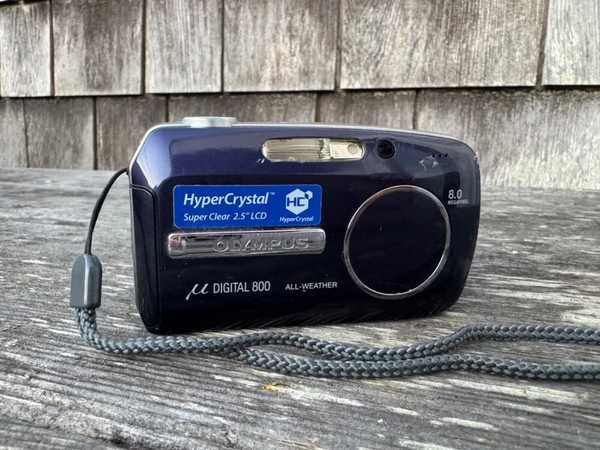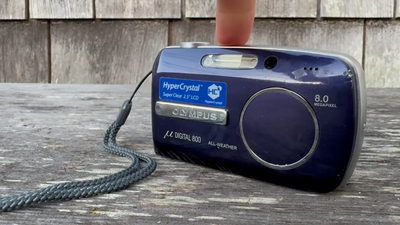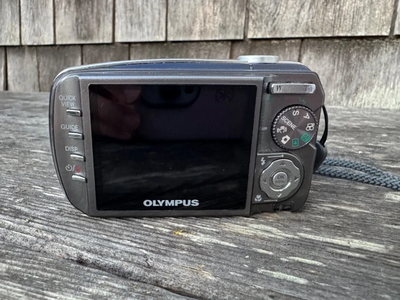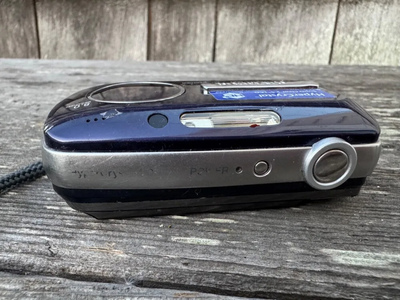
Olympus 800 Digital
| Brand | Olympus 2001 |
| Model | 225625 |
| Released Year | 2001 |
| Type | Digital Cameras |
| Series | Stylus |
| Optical Zoom | 3x |
| Status | Discontinued |
Quick view
Overview
The Olympus Stylus 800 Digital, released in 2001, was one of the pioneering compact digital cameras developed by Olympus as part of their Stylus series. It features a 0.8 megapixel CCD sensor providing images at 1024 x 768 resolution. This model incorporated a fixed 3x optical zoom lens with a focal length approximately between 35mm to 105mm equivalent. The camera operated with a traditional 1.8-inch LCD display, used xD-Picture Card for storage, and supported uncompressed TIFF and JPEG image formats. It offered manual and automatic exposure control features including aperture and shutter speed adjustments. Power was supplied by a proprietary rechargeable lithium-ion battery ensuring portability and adequate shooting duration for its time.
Connectivity options included USB 1.1 interface allowing transfer of images to a PC. The Olympus Stylus 800 Digital also featured basic video recording capabilities with audio, albeit at limited resolution and frame rates by modern standards. Its compact size and weather-sealed body made it suitable for casual photography with some ruggedness. The camera’s firmware included scene modes and white balance presets to optimize color accuracy under various lighting conditions.
Specifications
| MPN | 225625 |
| UPC | 0050332154711 |
| Model | 800 Digital |
| Digital Zoom | 5x |
| Features | Histogram Display, Not Interchangeable Lenses, Direct Print, Audio Recording, Red-Eye Correction, Digital Noise Reduction, DPOF Support, Resizing an Image, Auto Power Save, PictBridge Support, Digital Image Rotation, Print Image Matching, Water Resistant, USB 2.0 Compatibility, Red Eye Fix, Date/Time Stamp, Rgb Primary Color Filter, USB 2.0 |
| Series | Olympus Stylus |
| Optical Zoom | 3x |
| Depth | 1.3in |
| Width | 4.1in |
| Item Weight | 6.4 Oz. |
| Height | 2.3in |
| Waterproof | Yes |
| Screen Details | LCD Display-Tft Active Matrix-2.5"-Color |
| Exposure Compensation | ±2 Ev Range, in 1/3 Ev Steps |
| Light Sensitivity | Iso 64, Iso 800, Iso Auto, Iso 400, Iso 1600, Iso 200, Iso 100 |
| Sensor Type | CCD |
| Max Shutter Speed | 1/2000 Sec |
| Shooting Modes | Frame Movie Mode |
| Max Video Resolution | 320 X 240160x120640x480 (VGA) |
| Macro Focus Range | 3-50cm |
| Focal Length Equivalent to 35mm Camera | 38-114mm |
| Special Effects | Black & White, Sepia |
| Camera Flash Features | Fill-In Flash, Flash Off, Red-Eye Reduction Flash, Auto Flash |
| White Balance | Auto, Tungsten (Preset), Overcast (Preset), Fluorescent (Preset), Daylight / Sunny (Preset) |
| Focus Adjustment | Automatic |
| Battery Form Factor | Manufacturer Specific |
| Operating System Supported | Ms Windows XP, Ms Windows ME, Ms Windows 2000, Ms Windows 98SE, Apple Mac OS X 10.2 or Later |
| Expansion Slot | 1X xD-Picture Card |
| Sensor Size | 1/1.8in |
| Display Size | 2.5in |
| Still Image Format | JPEG |
| Exposure Modes | Program, Aperture-Priority, Shutter-Priority, Automatic |
| Microphone Operation Mode | Mono |
| Integrated Memory Size | 32MB |
| Display Rotation | Built-In |
| Digital Video Format | Quicktime |
| Screen Size | 2.0".5" |
| Light Sensitivity Max | 1600 |
| Max Operating Temperature | 40°C |
| Type | Point & Shoot |
| Maximum Resolution | 8.0MP |
| Red Eye Reduction | Yes |
| Min Shutter Speed | 4 Sec |
| Display Type | LCD |
| Sensor Resolution | 8.0MP |
| Exposure Metering | Multi-Segment, Spot |
| Additional Features | Histogram Display, Not Interchangeable Lenses, Direct Print, Audio Recording, Red-Eye Correction, Digital Noise Reduction, Resizing an Image, Auto Power Save, PictBridge Support, Digital Image Rotation, Print Image Matching, Water Resistant, USB 2.0 Compatibility, Red Eye Fix, Date/Time Stamp, Dpof Support, Rgb Primary Color Filter, USB 2.0 |
| Flash Type | Built-In Flash |
| Min Operating Temperature | 0°C |
| Effective Flash Range | 3.5m-12.8m |
| Exterior Color | Silver |
| Microphone Type | Microphone-Built-In-Electret Condenser-Mono |
| Connector Types | 1X Composite Video/Audio Output, 1X DC Power Input, 1X USB |
| Shooting Programs | Landscape-Portrait, Cuisine, Behind Glass, Portrait Mode, Landscape, Document, Beach/Snow, Sunset, Candle, Night Scene with Portrait, Self-Portrait, Sports Mode, 2in 1, Back Light, Night Scene, Indoor, Self-Portrait with Self-Timer, Fireworks, Panorama Assist |
| Flash Modes | Backlight Mode, Red-Eye Reduction, Fill-In Mode, Off Mode, Auto Mode |
| Camera Type | Point & Shoot |
| Auto Focus Type | TTL Contrast Detection |
| Viewfinder Type | Without Viewfinder, None |
| Supported Flash Memory | xD-Picture Card, xD-Picture Card Type H, xD-Picture Card Type M, Built-In |
| Continuous Shooting Speed | 1.3fps |
| Sensor | 0.8 megapixel CCD |
| Resolution | 1024 x 768 pixels |
| Lens | 3x optical zoom, approx. 35-105mm equivalent |
| Storage Media | xD-Picture Card |
| Display | 1.8-inch LCD screen |
| Image Formats | TIFF (uncompressed), JPEG |
| Battery | Proprietary rechargeable lithium-ion battery |
| Connectivity | USB 1.1 |
| Exposure Control | Manual and automatic aperture and shutter speed |
| Video Recording | Basic video with audio, limited resolution and frame rate |
| Dimensions | Compact form factor with splash and dust resistance |
| Weight | Approx. 200 grams |
Images
Key Advantages
The Olympus Stylus 800 Digital was celebrated for its compact and rugged design, offering splash and dust resistance uncommon in early digital cameras. It provided a solid 3x optical zoom lens, which was versatile for various shooting scenarios. The use of xD-Picture Card allowed for reasonably quick data transfer and increased storage flexibility. Battery life was commendable, with the proprietary lithium-ion battery supporting extended outdoor use. Image quality was respectable for the era, with uncompressed TIFF support allowing for better post-processing. The camera’s user interface was straightforward, making it accessible to beginner photographers.
Limitations
The 0.8 megapixel resolution is very low by modern standards, limiting large prints or cropping flexibility. The 1.8-inch LCD was relatively small and had limited color accuracy and brightness. The camera lacked advanced autofocus systems, resulting in slower or less accurate focusing in some conditions. Video capabilities were minimal and didn’t support high resolution or frame rates. The proprietary battery and storage media might be difficult to replace today due to obsolescence. Additionally, the USB 1.1 interface offered slow data transfer compared to contemporary standards.
FAQ
What is the megapixel resolution of the Olympus Stylus 800 Digital?
It features a 0.8 megapixel CCD sensor capable of producing images at 1024 x 768 resolution.
Does the Olympus Stylus 800 Digital have optical zoom?
Yes, it has a fixed 3x optical zoom lens.
What type of memory card does the Olympus Stylus 800 Digital use?
It uses xD-Picture Card for external memory storage.
Is the Olympus Stylus 800 Digital waterproof or rugged?
The camera features a rugged design with splash and dust resistance.
What are the image file formats supported?
It supports uncompressed TIFF and JPEG file formats.
Can it record video?
Yes, but video recording is basic with limitations on resolution and frame rate.
Is the Olympus Stylus 800 Digital still available for purchase new?
No, the model has been discontinued and is only available on secondary markets.
Disclaimer
The content on is provided for general informational purposes only. We do not guarantee the accuracy, completeness, or reliability of any information, specifications, or visuals presented on the site.
is not responsible for any content, images, or data uploaded or shared by users. Users are solely responsible for the content they submit.
We may include links to third-party websites for convenience. We do not endorse or take responsibility for the content or policies of any external sites.
Use of the site is at your own risk. Always verify critical information independently before making decisions based on content from this website.



